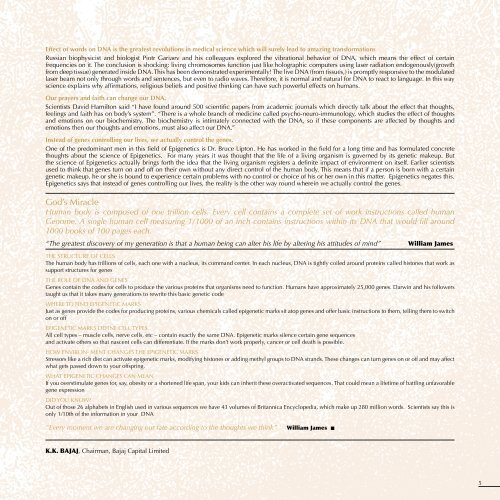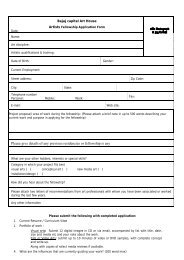download - Art Positive
download - Art Positive
download - Art Positive
Create successful ePaper yourself
Turn your PDF publications into a flip-book with our unique Google optimized e-Paper software.
Effect of words on DNA is the greatest revolutions in medical science which will surely lead to amazing transformations<br />
Russian biophysicist and biologist Piotr Gariaev and his colleagues explored the vibrational behavior of DNA, which means the effect of certain<br />
frequencies on it. The conclusion is shocking: living chromosomes function just like holographic computers using laser radiation endogenously(growth<br />
from deep tissue) generated inside DNA. This has been demonstrated experimentally! The live DNA (from tissues,) is promptly responsive to the modulated<br />
laser beam not only through words and sentences, but even to radio waves. Therefore, it is normal and natural for DNA to react to language. In this way<br />
science explains why affirmations, religious beliefs and positive thinking can have such powerful effects on humans.<br />
Our prayers and faith can change our DNA.<br />
Scientists David Hamilton said “I have found around 500 scientific papers from academic journals which directly talk about the effect that thoughts,<br />
feelings and faith has on body’s system”. “There is a whole branch of medicine called psycho-neuro-immunology, which studies the effect of thoughts<br />
and emotions on our biochemistry. The biochemistry is intimately connected with the DNA, so if these components are affected by thoughts and<br />
emotions then our thoughts and emotions, must also affect our DNA.”<br />
Instead of genes controlling our lives, we actually control the genes.<br />
One of the predominant men in this field of Epigenetics is Dr. Bruce Lipton. He has worked in the field for a long time and has formulated concrete<br />
thoughts about the science of Epigenetics. For many years it was thought that the life of a living organism is governed by its genetic makeup. But<br />
the science of Epigenetics actually brings forth the idea that the living organism registers a definite impact of environment on itself. Earlier scientists<br />
used to think that genes turn on and off on their own without any direct control of the human body. This means that if a person is born with a certain<br />
genetic makeup, he or she is bound to experience certain problems with no control or choice of his or her own in this matter. Epigenetics negates this.<br />
Epigenetics says that instead of genes controlling our lives, the reality is the other way round wherein we actually control the genes.<br />
God’s Miracle<br />
Human body is composed of one trillion cells. Every cell contains a complete set of work instructions called human<br />
Genome. A single human cell measuring 1/1000 of an inch contains instructions within its DNA that would fill around<br />
1000 books of 100 pages each.<br />
“The greatest discovery of my generation is that a human being can alter his life by altering his attitudes of mind”<br />
William James<br />
THE STRUCTURE OF CELLS<br />
The human body has trillions of cells, each one with a nucleus, its command center. In each nucleus, DNA is tightly coiled around proteins called histones that work as<br />
support structures for genes<br />
THE ROLE OF DNA AND GENES<br />
Genes contain the codes for cells to produce the various proteins that organisms need to function. Humans have approximately 25,000 genes. Darwin and his followers<br />
taught us that it takes many generations to rewrite this basic genetic code<br />
WHERE TO FIND EPIGENETIC MARKS<br />
Just as genes provide the codes for producing proteins, various chemicals called epigenetic marks sit atop genes and offer basic instructions to them, telling them to switch<br />
on or off<br />
EPIGENETIC MARKS DEFINE CELL TYPES<br />
All cell types – muscle cells, nerve cells, etc – contain exactly the same DNA. Epigenetic marks silence certain gene sequences<br />
and activate others so that nascent cells can differentiate. If the marks don’t work properly, cancer or cell death is possible.<br />
HOW ENVIRON- MENT CHANGES THE EPIGENETIC MARKS<br />
Stressors like a rich diet can activate epigenetic marks, modifying histones or adding methyl groups to DNA strands. These changes can turn genes on or off and may affect<br />
what gets passed down to your offspring.<br />
WHAT EPIGENETIC CHANGES CAN MEAN<br />
If you overstimulate genes for, say, obesity or a shortened life span, your kids can inherit these overactivated sequences. That could mean a lifetime of battling unfavorable<br />
gene expression<br />
DID YOU KNOW?<br />
Out of those 26 alphabets in English used in various sequences we have 43 volumes of Britannica Encyclopedia, which make up 280 million words. Scientists say this is<br />
only 1/10th of the information in your DNA<br />
“Every moment we are changing our fate according to the thoughts we think”<br />
William James<br />
K.K. BAJAJ, Chairman, Bajaj Capital Limited<br />
5




